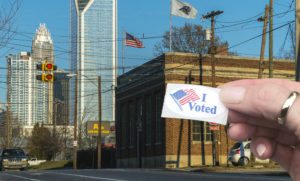 The State Board of Elections has reached a legal settlement with the United States Department of Justice in United States of America v. North Carolina State Board of Elections.
The State Board of Elections has reached a legal settlement with the United States Department of Justice in United States of America v. North Carolina State Board of Elections.
The settlement requires North Carolina’s State Board of Elections to overhaul voter registration procedures after the U.S. Department of Justice alleged violations of the Help America Vote Act (HAVA). The settlement addresses claims that thousands of voters were added to the rolls without the required identification numbers, raising concerns about compliance with federal election law.
Key Requirements in the Order
The new ruling mandates that:
-
Voter registration forms must require a driver’s license number or the last four digits of a Social Security number.
-
Counties must enter voter data into the statewide system within 10 days, or within 5 days near registration deadlines.
-
Voters already registered without identification numbers will receive two rounds of mailings requesting the missing information.
-
Those who fail to update their records must cast provisional ballots in federal elections, though their votes will still be counted if otherwise eligible.
-
County boards must review and correct outdated or incomplete voter records by August 31, 2025.
The order also establishes ongoing reporting requirements to the court and the DOJ, and it remains in effect until at least June 30, 2027.
Political Divisions
-
Republicans are likely to argue that the ruling finally forces North Carolina to enforce stricter ID requirements, aligning with broader GOP priorities around election integrity. The provisional ballot rule may be seen as too lenient by some, but overall, the mandate to capture driver’s license or Social Security numbers is likely to be welcomed.
-
Democrats may worry that aggressive enforcement could create unnecessary barriers for eligible voters who lack easy access to documents or who fail to respond to the mailings. While the order ensures provisional ballots will count, critics may argue the process risks confusing voters or creating longer lines on Election Day.
Local Impact
For voters, the most immediate change will be additional mailings from election officials and possible provisional voting requirements if records are incomplete. For county boards, the ruling creates significant new administrative burdens, including database cleanups and stricter deadlines.


